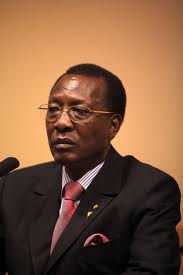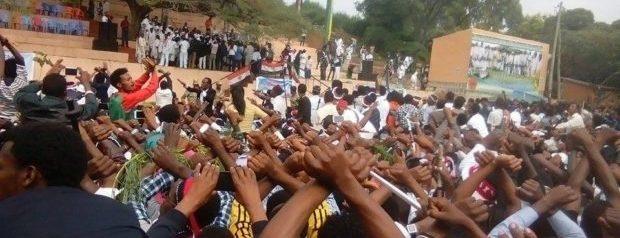Chad plays politics over costly Mali deployment – By Celeste Hicks


Chadian President Idris Deby will withdraw his troops from Mali, knowing that he gains little from the expected long haul.
President Deby of Chad’s announcement earlier this week that he was planning to withdraw his troops from northern Mali came as a surprise to many, but in the world of Chadian politics unexpected decisions pushed through by the President are more familiar.
While it seems there is scope for the Chadians to remain in Mali – through incorporation into the proposed UN force (which should take over from the Ecowas-led mission Afisma), it seems that in Deby’s mind – and indeed in many of the Chadian deputies in the National Assembly who voted almost unanimously in favour of the pull-out, Chad has already paid a high price. Few want to see the country’s troops going it alone in a bloody and protracted guerrilla war.
The decision was precipitated by the deaths last Friday of three Chadian soldiers in a suicide attack in Kidal, bringing the total number of Chadians killed to over 30. It’s no coincidence that it was made days after France announced the first withdrawal of its forces. And of course there’s the cost – estimates put it at some 90 million Euros already, and as Chadian MP Rhakis Saleh put it to RFI “Of course the cause is noble, but the hundreds of billions of CFA we have spent in this war could have helped to solve many of our own problems”.
If Chad’s announcement succeeds in jolting the UN into speeding up the deployment of a peacekeeping force (and paying), then Chad can play its role alongside other African nations without having to shoulder the entire burden. The bottom line for Deby is that the FATIM (Chadian Armed Forces Intervention in Mali) needs to pay clear dividends – as soon as it looks like becoming a liability, significant changes can be expected.
Until now the deployment has been a way to show how far Chad has come since the dark days of 2006 and 2008 when two serious rebellions came within hours of unseating Deby. It has helped to establish a narrative of the country as a regional leader, and perhaps persuade detractors that the $600m of oil revenues siphoned off from social spending plans, to buy military equipment – including six re-conditioned Sukhoi jets, attack helicopters and armoured personnel carriers – was money well spent. The PR coup gained from the claims that Chadian soldiers killed two senior AQMI leaders Abdelhamid Abou Zeid and Mokhtar Belmokhtar, only served to bolster that reputation.
It has also been an influence on the relationship with France, whose forces, in the guise of “˜Operation Epervier’, saved Deby’s skin five years ago as the rebels bombarded the gates of the presidential palace. The continuation of the Epervier force has been a constant source of discussion, but it now seems that France’s nod of respect to the Chadians for their desert fighting skills and uncomplicated response to the calls for help, may go some way to improving relations with the former colonial master.
But the hard days are ahead in Mali – Paris and N’Djamena both know that. Neither country wants to become mired in a guerrilla war which could last years. The flashpoints are already there – Kidal seems to still be in the hands of an off-shoot of the MNLA rebel group called MIA. Gao and Timbuktu have both seen suicide bomber attacks in the last few weeks, and there is widespread pessimism about the country’s ability to hold effective elections in July.
Chad has established its credentials through dramatic battlefield successes while the soldiers of neighbouring African countries – and Mali’s own national army – have been slow to deploy and are in need of training. Domestic support for the Chadian deployment has been high and so far there have been few public outbursts by families who have lost loved ones. The ANT (Armee National du Tchad) has refreshed its desert warfare skills which have been growing rusty since 2009, and for a brief period Deby distracted the nation from the very real developmental problems Chad faces, despite 10 years of oil production yielding some $10bn in revenue.
But now it seems that Deby feels – perhaps understandably – that the burden needs to be shared. It’s unimaginable that a poor country like Chad could support an open-ended commitment of 2000 troops in a foreign country, and inevitably public anger would rise if too many young men are coming home in body bags.
Domestically Deby still faces rebel threats – while the Mali crisis has been rumbling on, he sent his forces into neighbouring Central African Republic, initially in support of Francois Bozize, but latterly (according to Bozize himself) in support of the Seleka rebel coalition which toppled him. Since Bozize fled, clashes and killings have continued in Bangui and there is no indication that the new president, Michel Djotodia, will be able to secure the northern border. This is a completely ungovernable region where a myriad of rebel coalitions from CAR, Chad and Darfur have gathered and is used as a launch pad for their raids. The long defunct Chadian coalition, the UFR, recently announced they had not given up the fight.
Deby is not known as the Great Survivor for nothing – when he decides the time is up things often happen quickly. In 2009 he refused to sign the renewal of the mandate for the Minurcat UN peacekeeping mission in the east of the country, and by 2010 the operation was closed down. Deby wants to shift responsibility in Mali before distressed relatives, finance ministry officials or potential rebels in CAR take the shine off his success.
The news will leave many in Mali wondering if the vacuum which will be created by the French and Chadian withdrawals can be filled before Islamist and Tuareg rebel groups begin to claw back lost ground.
Celeste Hicks is a freelance journalist with a focus on African issues. She has a particular interest in the Sahel.






[…] security. (For great analysis on Déby’s great game with the international community, see Celeste Hicks and Alex […]